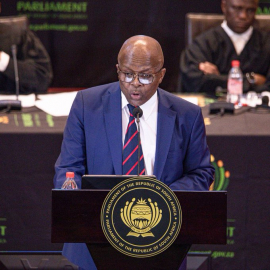
PRETORIA, Feb 15 (NNN-SANEWS) — South Africa’sMinister in the Presidency, Mondli Gungubele, says the declaration of the National State of Disaster on Energy will assist in the speedy resolution of energy supply challenges, whilst minimising its impact and contributing to the rebuilding process.
Addressing debate on this year’s State of the Nation Address (SONA), Gungubele said many sectors would benefit from the stable energy supply, leading to the creation of much-needed jobs.
Eskom has been battling to keep the lights on for the past few months, leading to increased stages of load shedding and a devastating impact on lives, livelihoods and businesses.
Last Thursday, President Cyril Ramaphosa declared a State of Disaster as a response to the current energy crisis gripping the country.
At the State of the Nation Address, the President explained that the declaration will enable government to “provide practical measures” to assist businesses that have been devastated by the effects of load shedding.
Where technically possible, it will also enable government to exempt critical infrastructure, such as hospitals and water treatment plants, from load shedding.
It will enable government to accelerate energy projects and limit regulatory requirements while maintaining rigorous environmental protection, as well as procurement principles and technical standards.
Furthermore, a Minister of Energy in the Presidency is expected to be appointed to focus solely on bringing the country out of the current energy deficit.
Prior to the declaration, government had already been working on ending load shedding, as the President announced a plan to address the crisis in July 2022.
The plan was developed through extensive consultation and endorsed by energy experts as providing the best and fastest path towards energy security.
Since the plan was announced, Gungubele said, there has been important progress in implementing the Energy Action Plan.
“As we stabilise the grid for the current economic environment, we must not forget that in the future, carbon intensity will be one of the key factors that affect the ability of our country to produce and trade in the global economy.
“To this end, there are several large initiatives that have taken off and should be scaling up in 2023/24, such as the implementation of the Green Hydrogen Strategy.
“South Africa’s Hydrogen Society (HySA) Roadmap spans for the next 10 years. Thus far, nine out of the 19 green hydrogen implementation projects that were identified have been successfully registered with Infrastructure South Africa,” Gungubele said. — NNN-SANEWS






